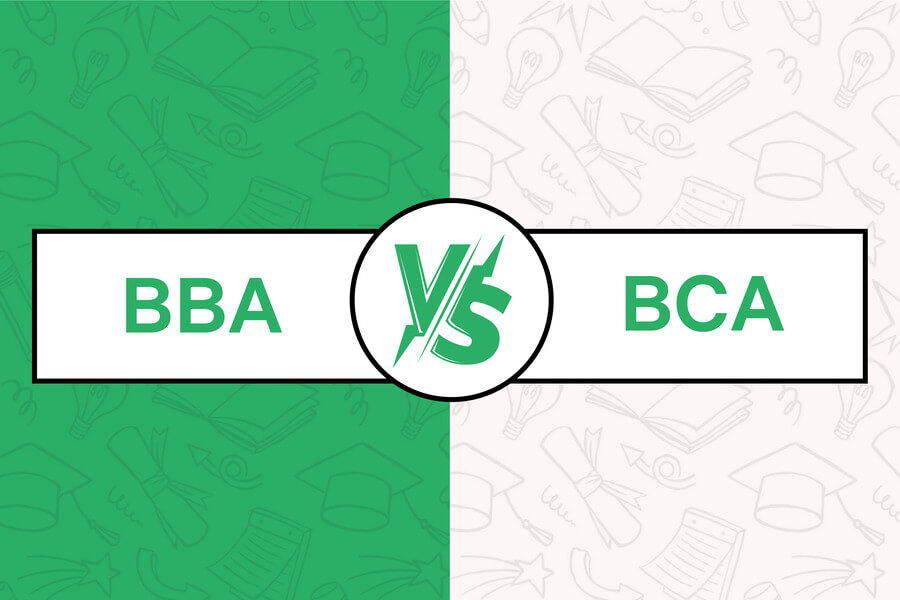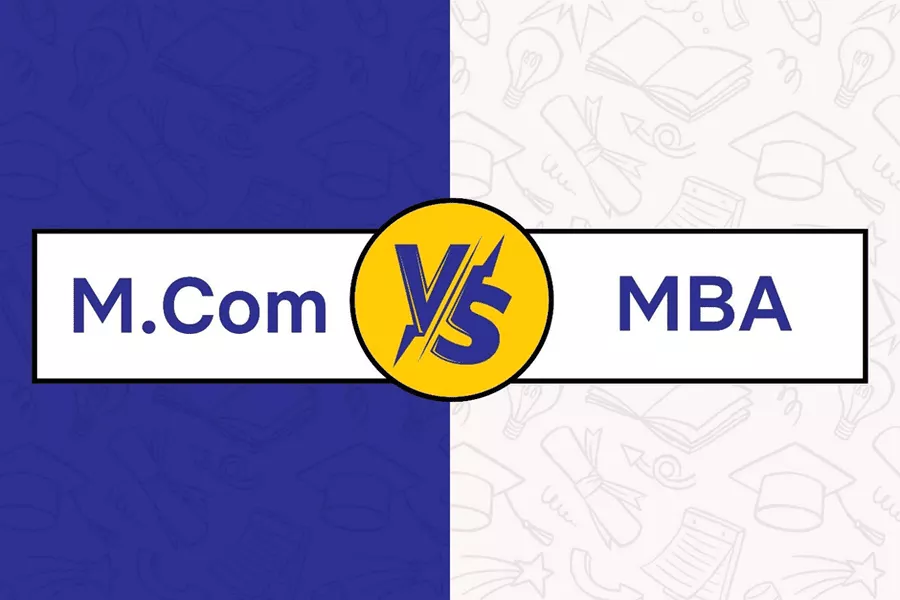Choosing the right undergraduate program after completing class 12 is a significant decision that can substantially shape a student’s career path. Today, BCA (Bachelor of Computer Applications) and BBA (Bachelor of Business Administration) are two of the most sought-after undergraduate programs. If you are eager to learn about computers, software and technology, BCA may be an ideal option for you. On the other hand, if you are passionate about business management, communication and strategic planning, BBA might suit you better.
But the question is, which is better for the future: BBA or BCA? The answer depends entirely on your interests and career goals. Before making a decision, it is essential to understand the key differences between the two programs. Both courses offer promising career opportunities and competitive earning capacity. Here’s everything you need to know to make an informed choice between BBA and BCA.
Understanding BBA
The Bachelor of Business Administration (BBA) is a three-year graduate program designed for students aiming to become future business leaders in various fields. The purpose of this course is to develop strong managerial and business skills among students. The curriculum includes a wide range of subjects, including marketing, finance, operations management, organisational behaviour and human resource management.
Along with class learning, the program emphasises practical interactive learning through case studies, internships and project work. Graduates with a BBA degree are well-equipped to take on managerial positions in fields such as banking, marketing, and human resources. The purpose of the program is to eventually shape professionals capable of managing and making strategic decisions in professional operations.
Must Read: Top Career Options After a BA Degree: Scope & Opportunities
Understanding BCA
The Bachelor of Computer Application (BCA) is a three-year undergraduate program for students who wish to pursue a career as software developers, data administrators or IT professionals. The primary focus of this course is to build a strong foundation in computer science and its practical applications. Major subjects include database management, networking, web development and software engineering as well as programming languages such as Java, C++ ++ and Python.
The program involves training on extensive hands-on through laboratory sessions, projects and internships to ensure real-world experience. BCA graduates are equipped to tackle technical roles in software development, IT counselling, network administration and related fields. The purpose of the BCA course is to develop professionals who can efficiently design, manage and maintain software systems and IT infrastructure.
Must Read: Top 10 High-Paying Courses After 12th (All Streams)
Salary Package After Completion of BBA & BCA Programs
There are several factors on which the salary of BBA and BCA graduates depends, such as skills, industry, and experience.
BBA Salary
- Freshers can expect an annual package ranging from ₹3 to ₹5 lakhs.
- Professionals with mid-level experience generally get between ₹6 and ₹10 lakhs per annum.
- Senior-level roles offer salaries in the range of ₹10 to ₹20 lakhs annually.
BCA Salary
- Entry-level professionals usually get a package of ₹2.5 to ₹4.5 lakhs per year.
- Those with moderate experience can expect salaries between ₹5 and ₹8 lakhs per annum.
- With experience and seniority, professionals in these domains can earn an annual salary ranging between ₹8 and ₹15 lakhs.
Must Read: High Paying Career Options After 12th Science Stream
BBA vs BCA: Key Highlights
Here is a quick comparison of BCA and BBA to help you decide which is better for you: –
| Factors | BBA (Bachelor of Business Administration) | BCA (Bachelor of Computer Applications) |
|---|---|---|
| Duration of Program | 3 years | 3 years |
| Eligibility | 50% or above in 10+2 from any stream | 50% or above in 10+2 |
| Area of Study | Business management and administration, accounting, marketing | Computer applications and software |
| Career opportunities | Management, marketing, finance, HR | Software development, IT, networking |
Must Read: Best Courses After 12th Commerce with High Salary in 2025
Career Paths After Completing the BBA Programme
- Retail Manager
- Financial Analyst
- Project Manager
- Marketing Executive
- Event Manager
- Operations Manager
- Business Consultant
Career Paths After Completing the BCA Programme
- Technical Analyst
- Blockchain Developer
- System Analyst
- E-Commerce Executive
- App Developer
- Software Developer
- Digital Marketer
Must Read: Career Options After BBA: Top 10 High-Paying Jobs for BBA Graduates
Reasons to Pursue BBA
- Diverse Career Opportunities: A BBA degree opens the doors to many career routes in areas such as marketing, advertising, finance, human resources and operations management.
- Strong Base for MBA: One of the major benefits of studying BBA is that it establishes a solid basis for those who plan to pursue an MBA in the future.
- Entrepreneurial Development: The program prepares students with essential business and management skills, which are necessary to start and run their own business.
- Real-World Exposure: Many BBA courses include internships and on-the-job training projects, providing students a better understanding of the real business environment and valuable industry experience.
Reasons to Pursue BCA
- Technical Focus: BCA students develop in-depth knowledge of computer applications, programming languages, and software development, equipping them for a career in the tech industry.
- Rising IT demand: Increasing dependence on technology has created a strong demand for skilled IT professionals, resulting in abundant job opportunities for BCA graduates.
- Preparation for MCA: BCA serves as an excellent stepping stone for those aiming to pursue a Master of Computer Applications (MCA).
- Diverse Career Path: Graduates can pursue special roles such as software developers, system analysts, web developers, and network administrators.
Must Read: Best Courses for Arts Students After 12th Grade: Your Complete Guide
BBA vs BCA: Which is Better?
The decision between pursuing a BBA or a BCA entirely depends on your interests and long-term career aspirations:
- If you are interested in business management, finance, marketing, or human resources, then consider opting for a BBA. This program is well-suited for leaders of leadership positions or aspiring entrepreneurs.
- If you are interested in computer science, programming languages, and the IT industry, consider pursuing a BCA. BCA is ideal for individuals seeking a career in software development or other IT-related fields.
Top Essential Skills Required after a Bachelor of Business Administration Course
- Leadership: The ability to effectively motivate, guide and manage teams.
- Communication: Strong oral and written communication skills for interactive conversations.
- Analytical thinking: Evaluating business conditions for informed decision making.
- Marketing expertise: Knowledge of consumer behaviour and proficiency in market research.
- Problem-solution: To identify and solve business challenges efficiently.
- Time management: Prioritise tasks to complete to meet committed deadlines.
- Strategic decision making: Preparing sound business strategies.
Top Essential Skills Required after a Bachelor of Computer Applications Degree Course
- Programming proficiency: Specialisation in languages like Python, Java and C++.
- Technical problem: Strong debugging and troubleshooting capabilities.
- Database management: Knowledge of SQL and familiarity with various database systems.
- Software development: Awareness of the development life cycle and functioning.
- Analytical thinking: skills in analysing the system and adaptation of performance.
- Adaptability: Stay updated with developed technologies and industry trends.
- Teamwork: To cooperate effectively with fellow IT professionals.
- Project management: Efficiently planning, organising and executing IT projects.
Many students often struggle to choose between BBA and BCA, as both courses are in high demand due to the rapid development of various industries. The right choice depends on your interests and career aspirations. Understanding the key differences between a BBA and a BCA is essential for making an informed and confident career choice. Regardless of which path you choose, both programs open doors to promote career opportunities and play a crucial role in enhancing your overall personality and professional development.








